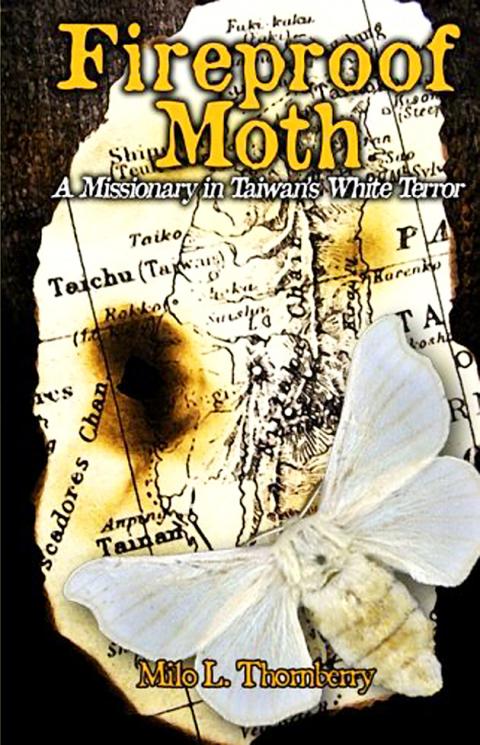Fireproof Moth is an autobiographical account of a Methodist missionary’s stay in Taiwan in the late 1960s, but it reads like a thriller.
Author Milo L. Thornberry first describes his personal journey to becoming a minister in the mid 1950s. In 1965, the Methodist Church decided to send Thornberry and his wife Judith to Taiwan, and the couple went through preparatory sessions at Drew University and Stony Point Missionary Orientation Center north of New York. During this time he read some critical works such as George Kerr’s Formosa Betrayed and Mark Mancall’s Formosa Today.
Upon arrival in Taipei on New Year’s Eve 1966 the couple settled down, started language school, and gradually came to experience the suffocating hold that the Chinese Nationalist Party (KMT) regime of Chiang Kai-shek (蔣介石) had on society in Taiwan. They also got to know Peng Ming-min (彭明敏), a professor who was under house arrest at the time for publishing a document titled A Manifesto for Self-Salvation in 1964.

The couple started to help channel support from overseas to families of political prisoners, with the help of Peng’s two courageous students, Hsieh Tsung-min (謝聰敏) and Wei Ting-chao (魏廷朝). They also began producing mimeographed information sheets to inform visiting friends and colleagues overseas about the repressive political atmosphere in the country.
Together with other foreign friends in Taiwan they approached American and European reporters and supplied background information on developments in Taiwan. Fox Butterfield of the New York Times and Selig Harrison of the Washington Post were among the reporters they communicated with.
When in September 1968 Peng told the couple that he had received indications from the Investigation Bureau of the Ministry of Justice, one of the main secret police organizations at the time, that he might have an “accident,” a plan was devised to smuggle him out of Taiwan. After more than a year of preparation the plan became a reality, and on Jan. 3, 1970, Peng left Taiwan using a doctored Japanese passport and disguised as a Japanese musician.
He made it safely to Sweden, where he received political asylum. Eventually Peng made it to the US, where he became a senior research scholar and visiting professor at the University of Michigan.
Oddly, the KMT authorities never discovered the role played by Thornberry and his wife in Peng’s escape. They surmised that he had been helped by the CIA. The matter even came up in the February 1972 discussions between then-US national security adviser Henry Kissinger and president Richard Nixon with Chinese premier Zhou Enlai (周恩來). Zhou accused the Americans of aiding Peng in his escape, but Nixon responded with indignation: “We had nothing to do with it.”
However, Taiwan’s secret police agencies kept an ever tightening watch over Milo and Judith, and on March 2, 1971 — more than a year after Peng’s escape — they were arrested and expelled from Taiwan. Selig Harrison visited them in their home while they were under house arrest and wrote a front-page article about it in the Washington Post (“Taiwan expels US missionary,” March 4, 1971).
It wasn’t until December 2003, at a reunion of human rights and democracy activists organized by the Taiwan Foundation for Democracy, that Milo and Judith — as well as the Japanese counterparts who also played a crucial role — disclosed their involvement in Peng’s escape.
The book reads like a spy thriller and fills a key void in the written history of Taiwan’s very recent transition to democracy. It is highly recommended.

In recent weeks the Trump Administration has been demanding that Taiwan transfer half of its chip manufacturing to the US. In an interview with NewsNation, US Secretary of Commerce Howard Lutnick said that the US would need 50 percent of domestic chip production to protect Taiwan. He stated, discussing Taiwan’s chip production: “My argument to them was, well, if you have 95 percent, how am I gonna get it to protect you? You’re going to put it on a plane? You’re going to put it on a boat?” The stench of the Trump Administration’s mafia-style notions of “protection” was strong

Every now and then, it’s nice to just point somewhere on a map and head out with no plan. In Taiwan, where convenience reigns, food options are plentiful and people are generally friendly and helpful, this type of trip is that much easier to pull off. One day last November, a spur-of-the-moment day hike in the hills of Chiayi County turned into a surprisingly memorable experience that impressed on me once again how fortunate we all are to call this island home. The scenery I walked through that day — a mix of forest and farms reaching up into the clouds

With one week left until election day, the drama is high in the race for the Chinese Nationalist Party (KMT) chair. The race is still potentially wide open between the three frontrunners. The most accurate poll is done by Apollo Survey & Research Co (艾普羅民調公司), which was conducted a week and a half ago with two-thirds of the respondents party members, who are the only ones eligible to vote. For details on the candidates, check the Oct. 4 edition of this column, “A look at the KMT chair candidates” on page 12. The popular frontrunner was 56-year-old Cheng Li-wun (鄭麗文)

Oct. 13 to Oct. 19 When ordered to resign from her teaching position in June 1928 due to her husband’s anti-colonial activities, Lin Shih-hao (林氏好) refused to back down. The next day, she still showed up at Tainan Second Preschool, where she was warned that she would be fired if she didn’t comply. Lin continued to ignore the orders and was eventually let go without severance — even losing her pay for that month. Rather than despairing, she found a non-government job and even joined her husband Lu Ping-ting’s (盧丙丁) non-violent resistance and labor rights movements. When the government’s 1931 crackdown